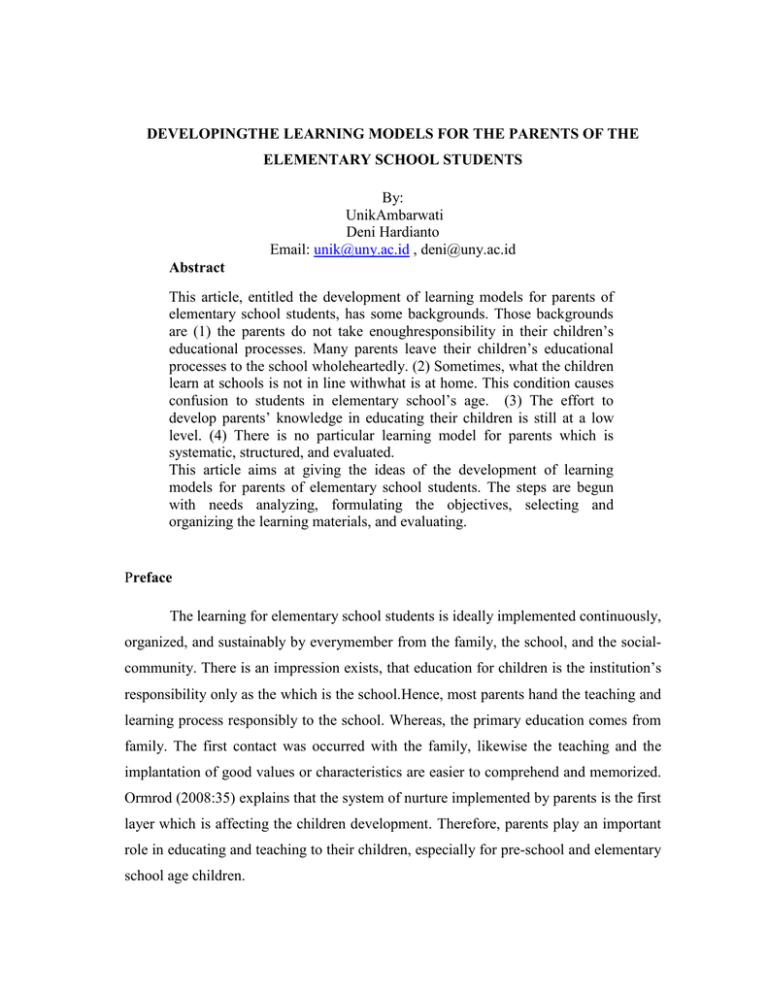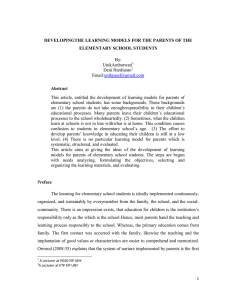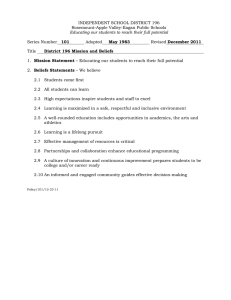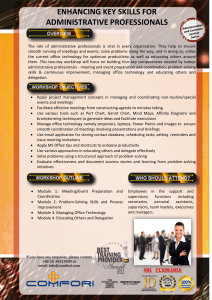DEVELOPINGTHE LEARNING MODELS FOR THE PARENTS OF THE ELEMENTARY SCHOOL STUDENTS Abstract By:
advertisement

DEVELOPINGTHE LEARNING MODELS FOR THE PARENTS OF THE ELEMENTARY SCHOOL STUDENTS By: UnikAmbarwati Deni Hardianto Email: unik@uny.ac.id , deni@uny.ac.id Abstract This article, entitled the development of learning models for parents of elementary school students, has some backgrounds. Those backgrounds are (1) the parents do not take enoughresponsibility in their children’s educational processes. Many parents leave their children’s educational processes to the school wholeheartedly. (2) Sometimes, what the children learn at schools is not in line withwhat is at home. This condition causes confusion to students in elementary school’s age. (3) The effort to develop parents’ knowledge in educating their children is still at a low level. (4) There is no particular learning model for parents which is systematic, structured, and evaluated. This article aims at giving the ideas of the development of learning models for parents of elementary school students. The steps are begun with needs analyzing, formulating the objectives, selecting and organizing the learning materials, and evaluating. Preface The learning for elementary school students is ideally implemented continuously, organized, and sustainably by everymember from the family, the school, and the socialcommunity. There is an impression exists, that education for children is the institution’s responsibility only as the which is the school.Hence, most parents hand the teaching and learning process responsibly to the school. Whereas, the primary education comes from family. The first contact was occurred with the family, likewise the teaching and the implantation of good values or characteristics are easier to comprehend and memorized. Ormrod (2008:35) explains that the system of nurture implemented by parents is the first layer which is affecting the children development. Therefore, parents play an important role in educating and teaching to their children, especially for pre-school and elementary school age children. For children, parents are their guide, example, teacher, and place to express the affection, heart, feeling and take cover. Based on the reasons above, parents have to be the ideal figures desired by their child. Parents have also to be responsible in teaching their child. Imam Al-Ghazali in Nur Abdul Hafizh (2010:46) states that a child is a mandate given to the parents. A child was born in a holy condition, raw without any effects from anything. Parents gave the first pattern, shape and color to the children development. Nowadays, parents play a little role as the centre in educating and teaching their children. In contrary, many cases of parents ignored the education of their children, many parents have a low understanding of the development of their children. Even, there is a case of children and parents who are hostile each other. Parents have less time than teacher at the school, friends, and TV at home have. Those problems are also followed by the lack of basic knowledge had by parents in order to teach their children, this is what makes the writer believes that sometimes it makes the process of education at school be less effective. For example, at school, children were taught to wash their hands before eating. On the contrary, at home, parents did nothing when they sawtheir children eat without washing their hands. Another example from school is when teacher gave instruction to the children to study a lot and not to watch TV for a long time, but parents let their children to watch TV for a long time at home. Many programs and teaching not in tune with the system of nurturing implemented by parents showed that parents are still lack of knowledge and understanding in teaching their children. Basic knowledge of how to teach children had by parents is the main problem that makes children do not get an optimal education. The existence of some parents’ assumptions that school takes a full responsibility of education is a form of parents’ incomprehension about their role and responsibility in teaching their children. Meanwhile, learning model for parents about the importance of the system of nurturing and teaching is still limited. The school program that is engaging and involving parents in implementing a sustainable education for children is also limited. Therefore, a program of improving parents’ basic knowledge in teaching children has to be kept on developing. School and family should be worked harmonically in teaching and learning process for children. Even, school can play a more important role such as, developing a learning model for parents. There is no particular learning model for parentsof the students developed by both of the government and the private. Whereas,parents need to get some insight and knowledge related to their children development. The learning model for parents can be realized including the school program. School can initiate the development of learning model for students’ parents into the school program. The school program can be a synergistic communication between parents and school in order to control their children development. Besides, this program can be filled with various materials which can give some insight to the parents about children education. Coming from issue and problem related to the learning model for parents, and also an effort to improve the quality of education and the parents’ involvement prevalently, it needs some ideas to develop the education for the parents of elementary school students. The question is on how to produce the learning model for students’ parents which is suitable with their needs and easy to be implemented? What steps is needed to do in order to construct and develop a unique learning model for the parents’ of elementary school students? The questions above is what the writer wants to analyze in this writing which can give some discourse on developing the learning model for the parents of elementary school students. The Review of the Responsibility of Children Education for Parents. Parents are the first and primary teachers for their children because children start to get early education from their parents. Generally, education in family is not coming from the awareness and understanding of teaching knowledge but natural environment and structure give any natural possibilities to build an educating environment. Naturally, parents do an educating process using their own style and system. Imam Al-Ghazali in Nur Abdul Hafizh (2010:46)states that a child is a mandate given to the parents. The appearance of educating climate and environment is caused by any interaction or relation of affection between parents and their children. As the first teacher on education process, parents play an important role in building children characteristic and personality. It means that the characteristic and personality depends on the early education coming from the parents to their children. Ratnawati (2001: 41) explains that the primary education comes from the family, the environment of the family has an important role to the children development. Parents’ role as the teachers in family is a basic of the peacefulness of life. Even, based on Islam perspective, family is not only taking part as the smallest environment but also taking part into the bigger environment or community in wide meaning. Children are valuable assets as generation successors. In the hands of these children the existence or extinction of a nation in 30 – 50 years will be decided. Adhim (2008) draws his dream in the phrase “50 tahun yang akan datang anak-anak kita...(next 50 years our children…)” It is clear that educating our children is important to prepare the next generations. The responsibilities needed to be resuscitated and developed by parents to their children are: Taking care of and bringing up children. Covering and insuring their health physically and spiritually from any interferences, illnesses, or hazardous environment. Educating them about any useful knowledge and skills for their life Giving them much happiness in their life and afterlife time by teaching them religious knowledge Thus, parents as the main educators firstly and lastly have complex comprehensive responsibilities related to the all aspects of life in term of physical or spiritual education. Those responsibilities are manifested by giving the knowledge of aqeedah, worship, intellectual, and psychological maturity. When a child gets ready to come to the school, parents have a responsibility to put her to school. Another aspect of parents’ responsibility is to providing children learning equipments at home, watching their converse, giving them a chance to share their problems. In this case, M. NgalimPurwanto expresses that the success of school education depends on the basic education given by the family. Education given by the family is a fundament for the next education received by the children. The result of education received by the children from their family determines the next level of education that will be received by the children in their schools or communities. That perception shows the importance of taking care of children education development. It is because an enough caring and guiding given by parents would support the success of children’s education. Unfortunately, many parents do not know their own child’s development, as what IrwanPrayitno (2003: 3) says that many parents assess their children development by seeing the development of their motoric skills and their speaking ability, whilst there are many other skills should be developed in children. Parents’ responsibilities in their children’s education have strong reasons. One form of those responsibilities is taking care of what children need in for their education such as providing learning tools and facilities for their children. All the things should be done by both parents cooperatively. 1. The Role of Parents in Educating Children in a Family In a family, parents have a big role in educating their children. The things parents should do as an ideal family in educating and exploring their children are; (a) understanding the significance of educating children, (b) avoiding any threats, persuading, promising any prizes to children, (c) avoiding become authoritarian, apathetic, spoiling the child, and worrying about children excessively, (d) understanding non verbally sign given by the children, (e) helping children to solve their problem together, (f) keeping the family harmony. 2. The Cooperation between Parents and Schools Education provides treatment and it needs much cost and takes a long time. Education is a holistic, synergic, and sustainable process. This process is implemented by schools, families, and societies. These three components need to walk together to get a good result. It is need an evaluating of educational processes given to the children by schools, parents, and societies in order to find a clear job for each. It is because in this case, the three components cannot be separated. Pendidikan di keluarga, Sekolah dan Masyarakat Keluarga Masyarakat Keluarga Anak Masyarakat Masyaraka t Sekolah Anak Anak & Keluarga Sekolah Sekolah Tidak Ideal Ideal Ideally, families, schools, and societies should support each other in order to reach the goal of education for children. However, in some cases, there are some who escape their responsibility. It makes the result is still below the expectation. As an educational institution, schools have a role to help the educational processes due to the limitation of time and power. Therefore, the cooperation from all parts is also needed in order to keep and develop the education for children. Based on the experiences, there some types of parents in responding their children’s education. First: parents who do not care of and being passive. Being a parent is not only about providing the learning equipment for children then being do not care of their development in school. All things happened in the educational process is not only job and responsibility of schools. Second: parents who watch and being responsive to their children’s education. Parents in this type stabilize and continue the lessons given by the teachers in the school at home. They also give samples to the children in applying the lesson gotten from school in their daily life. Some parents have been realized of their role so that they do not straightly blame the schools for the lack of educational processes. Parents in this type argue that the lack of education is also caused by them who have not run their role maximally. So, how about the parents who have not been aware with their role? There are many parents who assume that school as same as a restaurant. All things they ordered are all things they would get without doing any efforts. For this reason, schools have a job to make the parents aware of their roles. The schools can do that by holding a dialogue with parents, explaining the goal of children’s education expected by parents, and periodically, schools with parents and others communities such as government evaluate the development of students and find out the solution. Building up a good relationship among all parts to success the children’s education is not easy to do. It needs the maturity from all parts. Parents need to be more proactive in watching their children development. Schools need to be more elate to receive any complaints and suggestions from parents and do the follow up soon in order to get the expecting changes. It needs to maximize the cooperation among parents, schools, and societies in order to create the smart generations intellectually, spiritually, and emotionally. Furthermore, schools need to facilitate parents to develop the curriculum to improve parents’ knowledge in educating their children. The Developing of Learning Models for Parents of Elementary School Students Learning models for parents of elementary school students can be developed and initiated by the schools or parents. Schools may invite the parents then coordinating them to formulate the learning models for parents. It not difficult as long as schools establish a good communication and explain that children’s education is parents’ and schools’ responsibilities. School need to make parents sure that the success of children’s education depends on the cooperation between parents and schools. Parents and schools have roles which are balance, so that those roles should be shared by schools and parents. As the first step, schools can start it by involving parents to the schools’ programs. In the next step, schools, start to turn to develop learning models for parents by having the coordination with schools’ committee. Further, schools can start it by explaining the basic of the importance of education that are programmed systematically and continually. When the communication between parents and school has built up, schools can give the steps which are more systematic to develop the learning models for parents. The steps which can be implemented by the schools and parents in developing the learning models can be started from; need analyzing, formulating the objectives, selecting and organizing learning materials, selecting and organizing learning experiences, developing evaluation sets. The steps of learning models used in this article are the modification of any models, as explained in this following picture: First step in developing this model is analyzing the needs. The things done in Picture. Models of learning development for parents of elementary school students analyzing the need are analyzing the parents’ competency and knowledge in educating their children, parents psychology, parents’ learning style and strategy, elementary school students’ needs, children’s future chances and challenges, etc. The result of the analysis of needs is set as a basic to formulate the learning objective. The second step is formulating the objective. Formulating the objective is a set of need analysis which is based on parents’ agreement. This objective is a formulation of educational need for parents. Third; selecting and organizing learning materials. Learning materials are selected and arranged based on learning needs and objectives. Some examples of materials such as children’s education responsibility, a family is a key of success of children’s education till material about the error in educating children are needed to be known and understood by parents. Learning materials should be selected according to the parents’ need. Learning material can be designed and developed in the form of presentations, books, modules or other teaching materials. Fourth; selecting and organizing learning experiences. Learning experiences can be arranged based on parents’ situation and condition. Learning experiences can be implemented by presenting the sources or by learning independently helped by teaching materials provided. Fifth; developing evolution set. Evaluation in learning models for parents; of elementary school students need to be developed as simple as possible. It is no need to held a test but parents need no ask to each others about the material they have learnt. This model of evaluation is believed can improve parents’ knowledge. Conclusion The children’s education in elementary school ages is the first foundation to create a better generation. However, that foundation may not be strong if there is no optimal support from their schools and families. School is a place to forge any aspects on children, but parents also have a big role in creating and maintaining those aspects. Therefore, schools and families need to create a good cooperation in educatingtheir children. Furthermore, the parents need to have enough knowledge on how to educate their children better. Bibliography BundaArifah (2011) Smart Parenting With Love: perjalananasyikdaninspiratiffull time mommerajutkeluargapenuhcinta. Jakarta: Progressio Publishing DelsaJoesafira: Tanggungjawab orang tuaterhadapanakhttp://delsajoesafira.blogspot.com /2011/12/tanggung-jawab-orang-tua-terhadap.htmlDiaksestanggal 31 Desember 2012 IrwanPrayitno (2003) Anakkupenyejikhatiku. Jakarta: PustakaTarbiatuna Jeanne Ellis Ormrod (2008) PsikologiPendidikan; Membantusiswatumbuhdanberkembang. Jakarta: PenerbitErlangga M. Nur Abdul Hafizh (2010) Prophetic Parenting; caranabimendidikanak. Yogyakarta: Pro-U Media Muhammad Rasyid Dimas (2008) 20 KesalahanDalamMendidikAnak. Jakarta: Penerbit AlKautsar. Muhammad FauzilAdhim (2008) Positive Parenting; cara- caraislamimengembangkankarakterpositifpadaanak. Bandung: MizzanPustaka. Novi.Kerjasama orang tuadansekolah. http://edukasi.kompasiana.com/2012/09/08 /kerajasamaorang-tua-dan-sekolah-485098.html.Diaksestanggal 30 desember 2012 SinthaRatnawati (2000) Keluarga, KunciSuksesAnak; Kumpulan artikelKompas. Jakarta: Kompas SyekhKlalid Bin Abdurrahman (2012) KitabFikihMendidikAnakBerdasarkan danSunnahRasullulah Saw. Yogyakarta: DIVA Press Al-Quran



